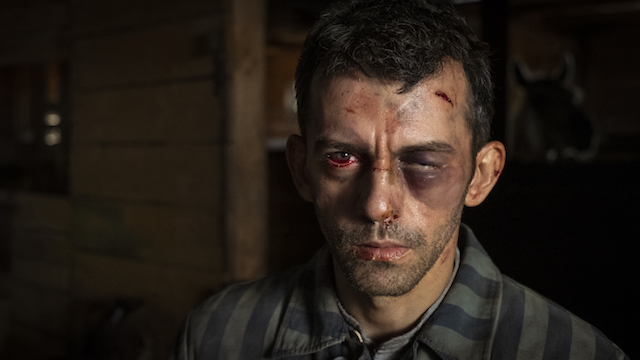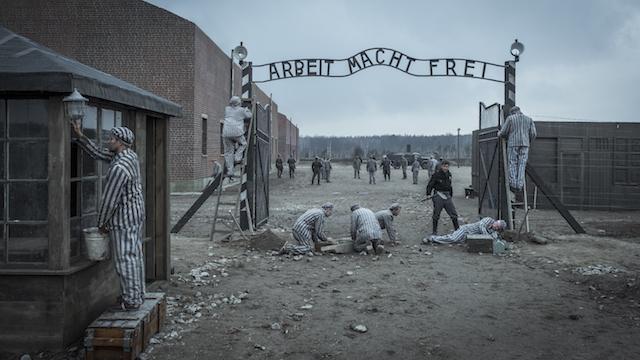It’s a little hard to tell if this film was really intended for an international release, given that its heart is so set on making Polish movie-goers proud of their countrymen. The Champion of Auschwitz recounts the true story of Tadeusz "Teddy" Pietrzykowski, a young bantamweight boxing champion from Warsaw who in 1940 was captured by the occupying Nazis as he tried to join the Polish army in France.
He was one of the first wave of political prisoners sent to Auschwitz, who were used as slave labour to reconfigure the old Polish army barracks into a death camp. Pietrzykowski survived the war by boxing against a series of prisoner and guard opponents for the entertainment of the camp commandants.  "Teddy" is played by Polish heart-throb Piotr Glowacki (pictured above), here suitably scrawny and battered to take on the role. The actor has a touch of the Hugh Jackmans about him, and he is as convincing in the ring as he is outside it. This may not be Raging Bull, but its fight scenes are very well staged. Compassionate and tough, Teddy takes another prisoner, Janek (a boyish Jan Szydlowski), under his wing and becomes hugely popular for sharing his extra rations with the other inmates.
"Teddy" is played by Polish heart-throb Piotr Glowacki (pictured above), here suitably scrawny and battered to take on the role. The actor has a touch of the Hugh Jackmans about him, and he is as convincing in the ring as he is outside it. This may not be Raging Bull, but its fight scenes are very well staged. Compassionate and tough, Teddy takes another prisoner, Janek (a boyish Jan Szydlowski), under his wing and becomes hugely popular for sharing his extra rations with the other inmates.
Marcus Barczewski directs in a conventional style – this is no Son of Saul with its disturbingly immersive vision of life in the camps – but it's handsomely shot. All the expected themes and tropes are here. There are sadistic sonderkommandos (prisoner guards) all too keen to inflict torment on their fellow Poles to please their Nazi masters. There are brave nurses in the infirmary and comradeship in the decrepit barracks contrasting with scenes of the luxurious life led in the Commandant’s villa. While Poland’s Jews (the predominant victims of Auschwitz-Birkenau) are not ignored – we see them being led to the entrance of the gas chambers, followed by Zyklon B being poured into the chimneys, and we hear their desperate final moments – they are very much not the focus of this film, which may be hard for some audiences.
The Champion of Auschwitz is considerably better than 1989’s egregious Triumph of the Spirit, the other film based-on-a-true story about a boxer surviving Auschwitz. The film’s American producer, Arnold Kopelson, managed to persuade the Polish authorities who preserve Auschwitz to let him shoot the film on the site itself – a favour denied Steven Spielberg when he made Schindler's List. Kopelson told me when I filmed an interview with him about his film that the boxer Salamo Arouch (played by Willem Dafoe) and the prisoners around him (all Jews from Thessaloniki in Greece) were purposely never described as Jewish in the script because he wanted Triumph of the Spirit “to be a universal story”. Shameful.
There’s an emphasis on Catholic faith in The Champion of Auschwitz with the repeated appearance of a carved wooden angel, but the film’s tone is not too evangelical even if its ultimate aim is to emphasise Poland’s history of oppression by the Nazis rather than any uncomfortable complicity in the Holocaust.















Add comment